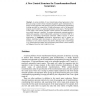Free Online Productivity Tools
i2Speak
i2Symbol
i2OCR
iTex2Img
iWeb2Print
iWeb2Shot
i2Type
iPdf2Split
iPdf2Merge
i2Bopomofo
i2Arabic
i2Style
i2Image
i2PDF
iLatex2Rtf
Sci2ools
114
click to vote
ICSR
2000
Springer
2000
Springer
A New Control Structure for Transformation-Based Generators
A serious problem of most transformation-based generators is that they are trying to achieve three mutually antagonistic goals simultaneously: 1) deeply factored operators and operands to gain the combinatorial programming leverage provided by composition, 2) high performance code in the generated program, and 3) small (i.e., practical) generation search spaces. The hypothesis of this paper is that current generator control structures are inadequate and a new control structure is required. To explore architectural variations needed to address this quandary, I have implemented a generator in Common LISP. It is called the Anticipatory Optimization Generator (AOG1 ) because it allows programmers to anticipate optimization opportunities and to prepare an , distributed plan that attempts to achieve them. The AOG system introduces a new control structure that allows differing kinds of knowledge (e.g., optimization knowledge) to be anticipated, placed where it will be needed, and triggered wh...
Combinatorial Programming Leverage | Control Structure | Factored Operators | ICSR 2000 | Software Engineering |
Related Content
| Added | 25 Aug 2010 |
| Updated | 25 Aug 2010 |
| Type | Conference |
| Year | 2000 |
| Where | ICSR |
| Authors | Ted J. Biggerstaff |
Comments (0)

